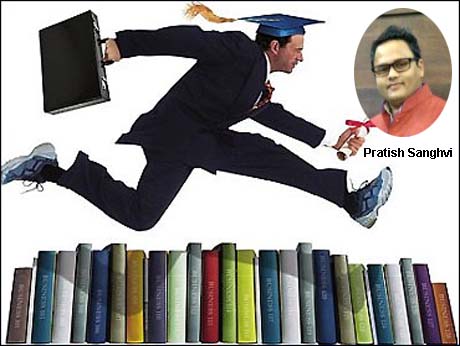
Pratish Sanghvi, Co-founder of the last mile delivery service company Grab.in, asks which makes sense -- learning the tricks of the trade from family or going to Business school
June 11 2017: The year is 1858, the British have just suppressed the Indian Rebellion of 1857 and there is intense mutual hatred among the two communities. A young Parsi graduate joins his father’s export trading firm, interacting with English merchants and selling goods in India. Attracting the suspicion of the English, he also earned the spite of the Indians as someone who is complicit with the ‘enemy.’ But the intense desire to grow, to expand, to establish a legacy and overall be the ‘Father of Indian industry’ is what drove Jamsetji Nusserwanji Tata to create an empire that is still regarded with reverence and respect in the chronicles of Indian business.
Business leaders who followed in his footsteps are innumerable. From Dhirubhai Ambani to NR Naryana Murthy, living in one-room chawls or being dependent on one’s wife’s last savings of Rs 10,000 could not deter the vision these people had. But one often wonders-Would they have been able to continue with such bravado, had a huge book or a PPT screamed out to them ‘it’s over, according to statistics, there’s no hope in business for you, leave, now’.
It is a known fact that knowledge, as it opens our intellect, also restricts our instincts. Infants would not deter from putting their fingers in the fire as they do not know better. But, as we equip them with knowledge, along creeps in the sense of fear, then risk, then failure, so on and so forth. Gradually, a conservative attitude develops which allows you to lead a good life, but not a great one.
Business schools today, in their quest to create individual stars of the future commercial ecosphere, often forget to instill the fundamental lessons that segregate the successful entrepreneur from the rest. While traditional businesses and family enterprises often start training the younger members of the family from a very young age, they are often not allowed to handle the significant matters. It is a bottom-to-top approach which is followed, in contrast with the B-school curriculum which from the very beginning, only trains students to become CEOs and managers, without giving them basic knowledge of the groundwork. As a result, in the real world, the powerpoints s and blueprints prepared by B-school grads fall flat on their face as they are impractical and made by considering only what Case Theory 101 ordered, not the ground reality.
Another observation in B-school learning’s today is the lack of attention to detail. Generations of business tycoons have grown up listening to stories of how JRD Tata as its Chairman, used to throw a fit even if there was one chink or a spot in the cutlery or plates on Air India’s flights. While these maybe ignored by B-school students as ‘redundant information’ or minor issues, the attitude of delivering an impeccable experience to the customer develops only when you have a strong sense of identification with the business and the desire for perfection.
It is no wonder then that even now, according to a recent study by OnStartups, 48.1% of entrepreneurs’ state that they grew up in a family business. While this does not indicate that entrepreneurs only belong to certain social strata, it poses an important question: The business world today is affected by an array of dimensions, from managing the various profiles of the business to handling consumer complaints on social media platforms. B-schools need to provide an ideal simulated condition for students to hone comprehensive skills that help to tackle all these issues, or start exposing them to the real business world early through meaningful internship programs. The very factor of an agile and impactful business decision, coupled with the constant desire for growth and higher revenue, is the ultimate tightrope walk any prospective entrepreneur needs to master, which can happen only through continuous exposure to such situations.
The difference between academic learning and learning from your familial settings is often summed up by the A to B exercise. Two children were asked to draw out a line from point A to point B, while one drew out the line according to the pathway given, the other straightaway joined A to B. Thus, while it is often necessary to circumvent the restrictions of the question to focus on the goal that needs to be achieved, receiving the right education and harnessing skills is also extremely important to survive the streets, as life, and especially business, is not always a straight line.
Pratish Sanghvi is the Director and Co-founder of Grab, India’s first and leading last-mile delivery service for businesses and merchants to bridge the gap between them and consumers. An MBA degree in Investment Management from Drexel University, Philadelphia, has helped Pratish to develop a broad perspective on the asset management business